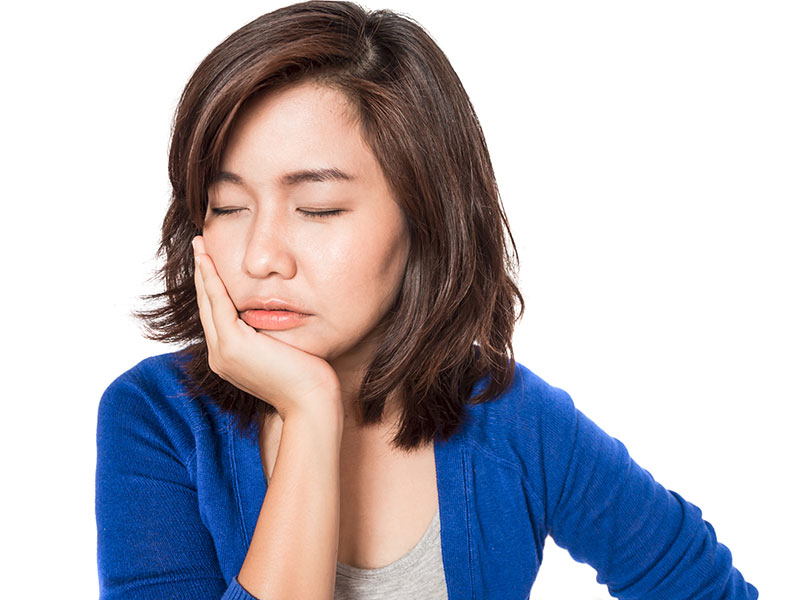
If you wake in the morning with a sore jaw and teeth, you could suffer from Bruxism. This is a condition that results from grinding or clenching the teeth while sleeping. It is estimated that
30 to 40 million adults and children suffer from the issue. There are several factors that can cause the condition, such as stress or sleep apnea. No matter the cause, effective treatment is critical. When left untreated, many painful symptoms and damage to the teeth can develop.
Symptoms of Bruxism
While many tend to believe that Bruxism only occurs while sleeping, it can occur during the day as well. You may feel contractions of your lower jaw muscles or hear grinding sounds. Most experience jaw muscles that feel tight and painful. In some cases, swelling may occur.
It is not uncommon to experience soreness in the neck, shoulders, or ears if you suffer from Bruxism. The teeth may also be sore and become loose due to the added strain. Many with Bruxism report ear pain or ringing in the ears. Sleep disorders, like sleep apnea, often accompany teeth grinding.
Causes of Bruxism
There are many reasons why you might grind or clench your teeth. However, 70% of people report stress and anxiety as primary triggers. When over-used, stimulants like alcohol, tobacco, and caffeine can worsen the severity of the condition. Those with obstructive sleep apnea are known to have an increased risk for grinding and clenching their teeth.
Treatment for Bruxism
Since stress is known to trigger grinding, it is important to learn stress management techniques. However, treatment from a dentist can also be helpful to protect your teeth from damage. The most effective treatment involves the use of a dental appliances. There are many different types of appliances, such as bite plates, occlusal bite guards, and night guards. However, the most preferred treatment is often a
mandibular advancement device.
These appliances are the same as those used to treat sleep apnea. As a result, if your grinding is caused by the sleep disorder, you will effectively treat both using one device. The device is custom-fitted over the top and bottom teeth to move your lower jaw forward. It helps to keep the airways open while stopping the grinding and clenching.
Dentist for Bruxism and Sleep Apnea Treatment
Research shows that bruxism is more frequently found in people who have obstructive sleep apnea. Since the sleep disorder causing significant health complications, such as cardiovascular disease, it is vital you have both Bruxism and sleep apnea treated.
Dr. Rodgers offers the effective solutions you need to stop teeth grinding, helping you sleep better. Oral appliances will restore your sleep quality while protecting your teeth from the damages of Bruxism. If you are ready to stop the discomfort, contact our office today to
schedule a consultation.
 If you wake in the morning with a sore jaw and teeth, you could suffer from Bruxism. This is a condition that results from grinding or clenching the teeth while sleeping. It is estimated that 30 to 40 million adults and children suffer from the issue. There are several factors that can cause the condition, such as stress or sleep apnea. No matter the cause, effective treatment is critical. When left untreated, many painful symptoms and damage to the teeth can develop.
If you wake in the morning with a sore jaw and teeth, you could suffer from Bruxism. This is a condition that results from grinding or clenching the teeth while sleeping. It is estimated that 30 to 40 million adults and children suffer from the issue. There are several factors that can cause the condition, such as stress or sleep apnea. No matter the cause, effective treatment is critical. When left untreated, many painful symptoms and damage to the teeth can develop.
 If you wake in the morning with a sore jaw and teeth, you could suffer from Bruxism. This is a condition that results from grinding or clenching the teeth while sleeping. It is estimated that 30 to 40 million adults and children suffer from the issue. There are several factors that can cause the condition, such as stress or sleep apnea. No matter the cause, effective treatment is critical. When left untreated, many painful symptoms and damage to the teeth can develop.
If you wake in the morning with a sore jaw and teeth, you could suffer from Bruxism. This is a condition that results from grinding or clenching the teeth while sleeping. It is estimated that 30 to 40 million adults and children suffer from the issue. There are several factors that can cause the condition, such as stress or sleep apnea. No matter the cause, effective treatment is critical. When left untreated, many painful symptoms and damage to the teeth can develop.
